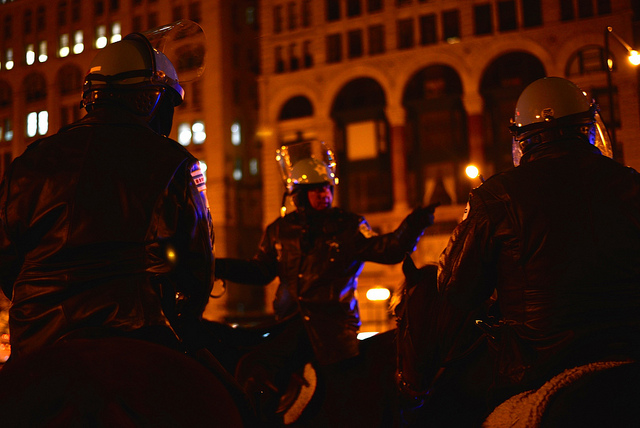Chicago Police May Have Spied On Black And Left-Wing Activists
By Mae Rice in News on Nov 14, 2015 9:29PM
Since Michael Brown was killed in Ferguson in 2014, Chicago cops have been spying on local police reform activists without proper authorization, according to the Sun-Times. The surveillance has primarily targeted black and left-wing protesters.
The Chicago Police Department has acknowledged this surveillance previously, but claimed, and still claims, that it was above board. The Sun-Times, based on internal CPD documents obtained through the Freedom of Information Act, argues otherwise.
At its core, this is a controversy about what constitutes a police investigation in the age of the internet. Does it mean a cop gathers information? Or does it mean, more specifically, that a cop leverages his government authority to gather otherwise unavailable information?
In the piece, the Sun-Times' Mick Dumke takes the former, broader view, describing one incident of what he calls police overreach. It began when a U.S. State Department worker emailed Chicago police, asking whether they had heard "chatter" about local vigils being held in honor of Michael Brown, an unarmed black teenager fatally shot by a white police officer. The shooting caused an uproar, and brought national attention to the problem of police misconduct and use of force.
Half and hour after receiving this email, Chicago police officials responded with details of a rally activists were planning at the Daley Center. The email included, in italics, a note that “some of this information describes First Amendment-protected activities.” Dumke adds that:
Under the police department’s rules... officers aren’t supposed to be investigating anyone for exercising their rights of free speech and assembly unless they have “reasonable suspicion” of a crime.Even then, the police are required to fill out worksheets explaining the justification and scope of such “First Amendment-related” investigations. The worksheets must be approved by the department’s general counsel.
The police didn't fill out any worksheets or seek legal approval before collecting and sharing the information on the Daley Center rally.
Dumke goes on to detail several other incidents of police researching protests and activist groups online, including one in which they targeted Grant Newburger, an organizer of the Revolution Club, with two unsubstantiated felony assault charges. Newburger believes this was a result of “the police spying on people.”
However, the police—unsurprisingly—don’t see quite eye to eye with Dumke and Newburger. They take a narrower view of what constitutes an investigation, and see facts any civilian can turn up with a quick Google as fair-game intel. As police spokesman Anthony Guglielmi put it:
“[These incidents] are examples of what would precede the opening of a First Amendment investigation. [...] These fact-finding efforts are permitted under departmental general orders in circumstances when information is publicly available, including on Internet sites and public spaces.”
Basically, cops have been looking casually at public online information—personal Facebook pages, Facebook groups and events, and activist websites—to research people and protests with no known criminal links. It’s certainly not as invasive as the undercover agitation revealed in the NATO Three trials, and the cops themselves don’t think it’s a problem, probably because civilians do the same thing to each other every day. Still, cops aren’t civilians. In some cases—perhaps including the ones detailed in the piece—they should be held to different rules.
